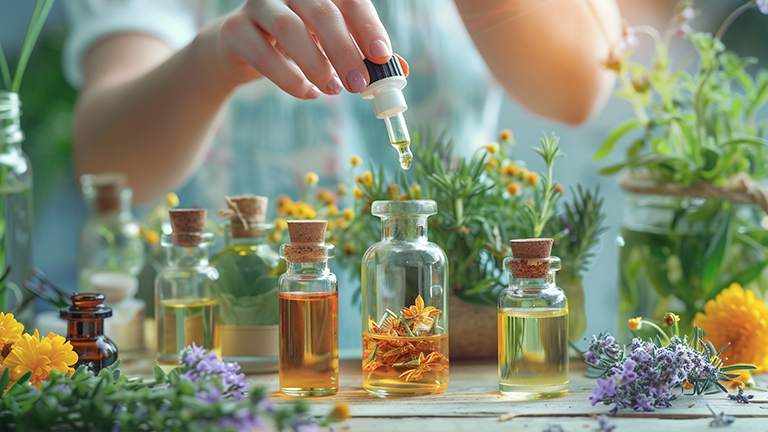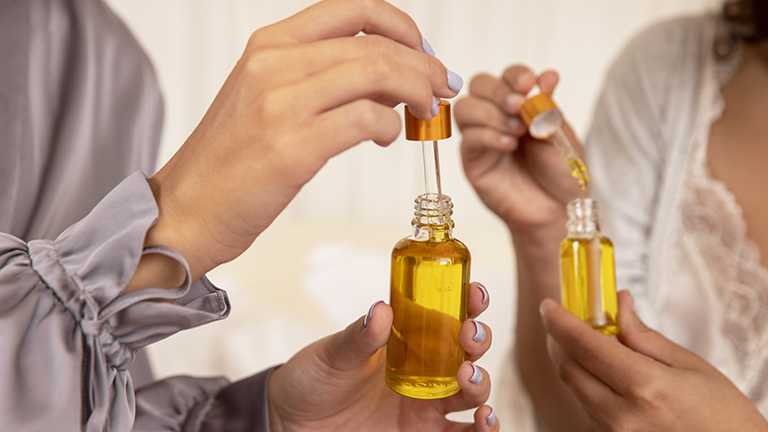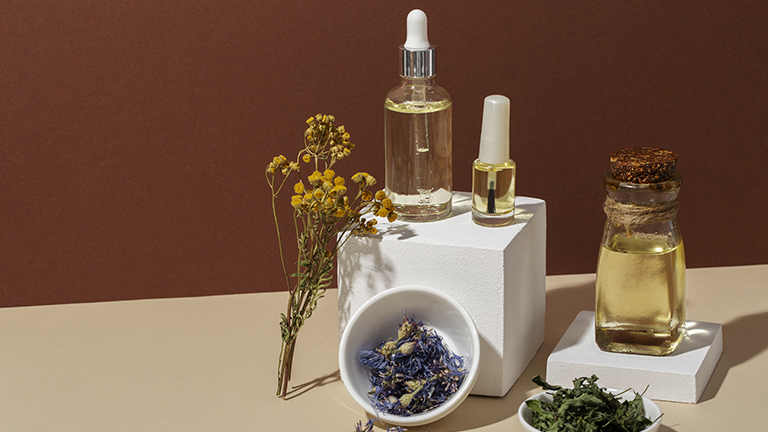Essential Oils for Stress and Anxiety: Essential oils are highly concentrated plant extracts that capture the natural fragrance and healing compounds of flowers, leaves, stems, bark, or roots. For centuries, they have been used in traditional medicine systems such as Ayurveda, Chinese medicine, and aromatherapy to promote relaxation, balance emotions, and enhance mental well-being.
When inhaled or applied topically, essential oils stimulate the olfactory system, which is directly connected to the brain’s limbic system. This part of the brain regulates emotions, memory, and stress response. This is why certain essential oils can create a calming effect, reduce cortisol levels, and help manage symptoms of anxiety. Unlike synthetic medications, they are a natural approach to supporting emotional health.
Research has shown that aromatherapy can have a significant impact on the nervous system, making essential oils a popular complementary therapy for those looking to reduce stress naturally. They do not replace medical treatment but can be a safe addition to a holistic wellness plan.
Benefits of Essential Oils for Stress and Anxiety Relief
Essential oils provide a wide range of benefits when it comes to reducing stress and easing anxiety. One of the most common advantages is relaxation, which helps calm an overactive mind. Oils like lavender and chamomile have been shown to promote better sleep, which is essential for emotional balance.
Another benefit is improved mood. Oils such as bergamot and ylang-ylang are known for their uplifting qualities, making them effective for people struggling with mild depression or low energy caused by chronic stress. Essential oils also help regulate breathing patterns, lower heart rate, and create a sense of inner peace, which is particularly useful during anxiety episodes.
Additionally, many essential oils contain anti-inflammatory and antioxidant properties. These compounds help reduce oxidative stress in the body, which is linked to anxiety and mental fatigue. By supporting overall well-being, essential oils become a valuable natural remedy in managing stress without the side effects of pharmaceuticals.
[INSERT_ELEMENTOR id=”5108″]
Top 10 Essential Oils for Stress and Anxiety You Should Try
Lavender Essential Oil for Relaxation
Lavender is the most widely studied and recommended essential oil for anxiety relief. Its soothing aroma reduces cortisol levels, promotes better sleep, and helps calm racing thoughts. Studies show that inhaling lavender oil or using it in a diffuser before bedtime can significantly improve sleep quality in people struggling with stress and anxiety.
Chamomile Essential Oil for Anxiety Relief
Chamomile, especially Roman chamomile, is known for its gentle calming effects. It works by reducing nervous tension and promoting relaxation. Chamomile tea is already a popular remedy for stress, and the essential oil offers similar benefits in a concentrated form. It can be used in aromatherapy or diluted with a carrier oil for massage to relieve stress-induced muscle tension.
Ylang-Ylang Oil for Emotional Balance
Ylang-ylang essential oil has a sweet, floral fragrance that helps reduce stress while uplifting mood. It is particularly effective in calming anger, irritability, or restlessness. Research suggests that inhaling ylang-ylang oil lowers blood pressure and helps restore emotional balance, making it a great option for people dealing with anxiety.
Bergamot Oil for Stress Reduction
Bergamot oil, extracted from the peel of bergamot oranges, has both calming and energizing effects. It reduces nervous tension while uplifting mood, making it perfect for people who feel anxious and fatigued at the same time. Bergamot is often used in stress-relief blends and works well in diffusers or massage oils.
Frankincense Oil for Calming the Mind
Frankincense essential oil has been valued for centuries in spiritual practices for its grounding and meditative qualities. Its earthy aroma helps reduce overthinking, deepen breathing, and calm anxiety. Many people use frankincense during meditation or yoga sessions to enhance relaxation and mental clarity.
Rose Essential Oil for Comfort and Calm
Rose essential oil has a soothing floral aroma that is linked with emotional healing. It reduces symptoms of anxiety, promotes feelings of self-love, and helps manage stress caused by grief or trauma. Studies show that rose oil can also reduce heart rate and lower blood pressure during stressful situations.
Clary Sage Essential Oil for Stress Management
Clary sage oil is known for balancing hormones and easing tension. It has antidepressant effects that make it useful for reducing stress-related mood swings. Many women use it for menstrual discomfort, but its calming properties extend to general stress relief as well.
Sandalwood Oil for Deep Relaxation
Sandalwood has a woody, rich aroma that promotes inner peace. It is often used in meditation practices to reduce anxiety and enhance focus. Sandalwood oil works by lowering stress responses in the nervous system and is especially helpful when used before bedtime for deep relaxation.
Lemon Essential Oil for Uplifting Energy
Lemon oil is known for its fresh, citrusy scent that instantly boosts mood and energy. While not as sedating as lavender or chamomile, it helps reduce mental fatigue, clears the mind, and supports positivity. Lemon oil is ideal for people who feel stressed due to low motivation or burnout.
Peppermint Essential Oil for Refreshing Calm
Peppermint oil is invigorating yet calming, making it useful for relieving stress-related headaches and tension. Its cooling effect helps refresh the mind and improve focus. It is particularly helpful for people whose stress manifests in physical symptoms such as migraines or muscle tightness.
How to Use Essential Oils Safely for Stress and Anxiety
Best Ways to Apply Essential Oils
There are several safe methods for using essential oils for stress and anxiety. The most popular method is diffusion, where oils are added to a diffuser with water to release a fine mist of therapeutic aroma. This allows for continuous inhalation in a relaxing environment.
Another method is direct inhalation, where a few drops are added to a cotton ball or tissue and inhaled deeply. For physical relaxation, essential oils can be diluted with a carrier oil such as coconut or jojoba and massaged into the skin. Adding a few drops to bathwater also creates a soothing experience that combines aromatherapy with warm water relaxation.
How Often Should You Use Essential Oils for Stress Relief?
Consistency is key when using essential oils for stress and anxiety. While occasional use provides temporary relief, incorporating them into a daily wellness routine ensures long-term benefits. Most people find using a diffuser for 30–60 minutes a few times per day effective. Massage or bath applications can be done two to three times per week for deeper relaxation.
Best Essential Oil Blends for Relaxation and Calmness
Blending different oils enhances their therapeutic effects. A popular calming blend is lavender, chamomile, and frankincense, which creates a deep sense of peace. For uplifting energy, a mix of bergamot, lemon, and ylang-ylang works well. Those who struggle with insomnia may benefit from combining lavender, sandalwood, and clary sage for a restful night’s sleep.
Experimenting with blends allows individuals to find what works best for their unique emotional state. Many companies also offer pre-made blends specifically designed for stress and anxiety, which can be a convenient option.
The Science Behind Aromatherapy and Stress Relief
Scientific research supports the effectiveness of aromatherapy in reducing stress and anxiety. Studies show that inhaling lavender oil reduces cortisol levels, while bergamot oil improves mood by increasing serotonin production. Chamomile oil has been found to lower generalized anxiety symptoms, making it a natural alternative for mild stress management.
The physiological impact of essential oils comes from their ability to interact with the brain’s neurotransmitters. For example, linalool, a compound found in lavender, has sedative effects, while limonene, found in citrus oils, has mood-boosting properties. These natural compounds work in harmony with the body to restore balance and promote relaxation.
Safety Tips and Precautions When Using Essential Oils
Although essential oils are natural, they must be used with caution. They should always be diluted with a carrier oil before applying to the skin to prevent irritation. Some oils, like citrus oils, can cause photosensitivity and should not be applied before sun exposure.
Pregnant women, nursing mothers, and people with medical conditions should consult a healthcare professional before using essential oils. Additionally, essential oils should not be ingested unless guided by a qualified professional, as they are highly concentrated and can cause adverse effects.
Lifestyle Tips Along with Essential Oils for Managing Stress and Anxiety
While essential oils provide significant support, they work best when combined with other stress management techniques. Regular exercise, balanced nutrition, mindfulness meditation, and proper sleep all contribute to lowering stress levels. Essential oils can enhance these practices by creating a calming environment and supporting relaxation rituals.
For example, practicing yoga with sandalwood or frankincense diffused in the room enhances focus and tranquility. Drinking chamomile tea before bed along with diffusing lavender oil can create a powerful bedtime routine that combats insomnia caused by anxiety.
Frequently Asked Questions About Essential Oils for Stress and Anxiety
Can Essential Oils Replace Anxiety Medication?
Essential oils are a supportive therapy, not a replacement for prescribed medication. They can complement medical treatment by reducing symptoms naturally, but severe anxiety disorders should be managed by healthcare professionals.
What Is the Best Essential Oil for Anxiety?
Lavender is the most researched and recommended essential oil for anxiety due to its calming and sleep-enhancing effects. However, chamomile, bergamot, and frankincense are also highly effective depending on personal preference.
Are Essential Oils Safe for Children and Pets?
Some essential oils are safe for children in diluted forms, but others may be too strong. Always consult a pediatrician before using them with children. For pets, certain oils can be toxic, so it’s essential to research pet-safe options before diffusing around animals.
Final Thoughts: Can Essential Oils Really Reduce Stress Naturally?
Essential oils offer a natural and holistic way to manage stress and anxiety. By harnessing the therapeutic power of plants, they help balance emotions, promote relaxation, and support mental well-being. While they are not a cure for clinical anxiety disorders, they are an effective addition to a healthy lifestyle.
For people in the USA, UK, Canada, and around the world, essential oils are becoming an accessible and safe alternative to conventional stress-relief methods. By using oils like lavender, chamomile, ylang-ylang, and bergamot regularly, anyone can create a calming environment that supports emotional resilience and a more balanced life.



